
Spirit possession is an unusual or altered state of consciousness and associated behaviors purportedly caused by the control of a human body by spirits, ghosts, demons, or gods. The concept of spirit possession exists in many cultures and religions, including Buddhism, Christianity, Haitian Vodou, Hinduism, Islam, Wicca, and Southeast Asian, African, and Native American traditions. Depending on the cultural context in which it is found, possession may be considered voluntary or involuntary and may be considered to have beneficial or detrimental effects on the host.

The Boxer Rebellion, also known as the Boxer Uprising, the Boxer Insurrection, or the Yihetuan Movement, was an anti-foreign, anti-colonial, and anti-Christian uprising in China between 1899 and 1901, towards the end of the Qing dynasty, by the Society of Righteous and Harmonious Fists, known as the "Boxers" in English because many of its members had practised Chinese martial arts, which at the time were referred to as "Chinese boxing".

Filipino shamans, commonly known as Babaylan, were shamans of the various ethnic groups of the pre-colonial Philippine islands. These shamans specialized in communicating, appeasing, or harnessing the spirits of the dead and the spirits of nature. They were almost always women or feminized men. They were believed to have spirit guides, by which they could contact and interact with the spirits and deities and the spirit world. Their primary role were as mediums during pag-anito séance rituals. There were also various subtypes of babaylan specializing in the arts of healing and herbalism, divination, and sorcery.
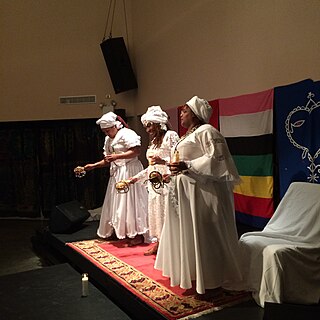
A manbo is a priestess in the Haitian Vodou religion. Haitian Vodou's conceptions of priesthood stem from the religious traditions of enslaved people from Dahomey, in what is today Benin. For instance, the term manbo derives from the Fon word nanbo. Like their West African counterparts, Haitian manbos are female leaders in Vodou temples who perform healing work and guide others during complex rituals. This form of female leadership is prevalent in urban centers such as Port-au-Prince. Typically, there is no hierarchy among manbos and oungans. These priestesses and priests serve as the heads of autonomous religious groups and exert their authority over the devotees or spiritual servants in their hounfo (temples).

Arthur Henderson Smith was a missionary of the American Board of Commissioners for Foreign Missions noted for spending 54 years as a missionary in China and writing books which presented China to foreign readers. These books include Chinese Characteristics, Village Life in China and The Uplift of China. In the 1920s, Chinese Characteristics was still the most widely read book on China among foreign residents there.

The Battle of Peking, or historically the Relief of Peking, was the battle fought on 14–15 August 1900 in Peking, in which the Eight-Nation Alliance relieved the siege of the Peking Legation Quarter during the Boxer Rebellion. From 20 June 1900, Boxers and Imperial Chinese Army troops had besieged foreign diplomats, citizens and soldiers within the legations of Austria-Hungary, Belgium, Britain, France, Italy, Germany, Japan, Netherlands, Russia, Spain and the United States.

The Battle of the Taku or Dagu Forts was a short engagement during the Boxer Rebellion between the Chinese Qing dynasty military and forces belonging to Eight Nation Alliance in June 1900. Western and Japanese naval forces captured the Taku forts after a brief but bloody battle with units of the Qing dynasty. Their loss prompted the Qing government to side with the Boxers while the Chinese army was ordered to resist all foreign military forces within Chinese territory. Allied powers remained in control of the forts until the end of the Boxer Rebellion in September 1901.
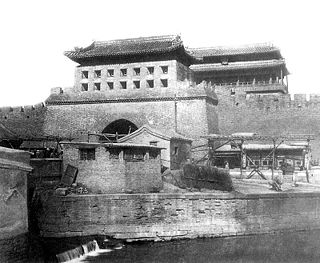
Yongdingmen, literally meaning “Gate of Perpetual Peace”, was the former front gate of the outer city of Beijing's old city wall. Originally built in 1553 during Ming Dynasty, it was torn down in the 1950s to make way for the new road system in Beijing. In 2005, the Yongdingmen was reconstructed at the site of the old city gate. This new gate is disconnected from the original road leading towards the gate and into the city.
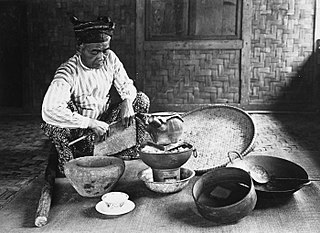
A dukun is an Indonesian term for shaman. Their societal role is that of a traditional healer, spirit medium, custom and tradition experts and on occasion sorcerers and masters of black magic. In common usage the dukun is often confused with another type of shaman, the pawang. It is often mistranslated into English as "witch doctor" or "medicine man". Many self-styled dukun in Indonesia are simply scammers and criminals, preying on gullible and superstitious people who were raised to believe in the supernatural.

The "China Martyrs of 1900" is a term used by some Protestant Christians to refer to American and European missionaries and converts who were murdered during the Boxer Rebellion, when Boxers carried out violent attacks targeting Christians and foreigners in northern China.
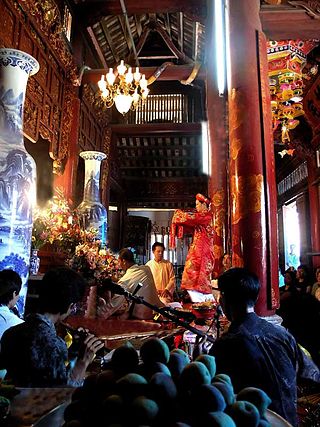
Lên đồng is a ritual practiced in Vietnamese folk religion, in which followers become spirit mediums for various kinds of spirits.
Spiritualism is a metaphysical belief that the world is made up of at least two fundamental substances, matter and spirit. This very broad metaphysical distinction is further developed into many and various forms by the inclusion of details about what spiritual entities exist such as a soul, the afterlife, spirits of the dead, deities and mediums; as well as details about the nature of the relationship between spirit and matter. It may also refer to the philosophy, doctrine, or religion pertaining to a spiritual aspect of existence.

The Battle of Tientsin, or the Relief of Tientsin, occurred on 13–14 July 1900, during the Boxer Rebellion in Northern China. A multinational military force, representing the Eight-Nation Alliance, rescued a besieged population of foreign nationals in the city of Tientsin by defeating the Chinese Imperial army and Boxers. The capture of Tientsin gave the Eight-Nation Alliance a base to launch a rescue mission for the foreign nationals besieged in the Legation Quarter of Beijing and to capture Beijing in the Battle of Peking (1900).
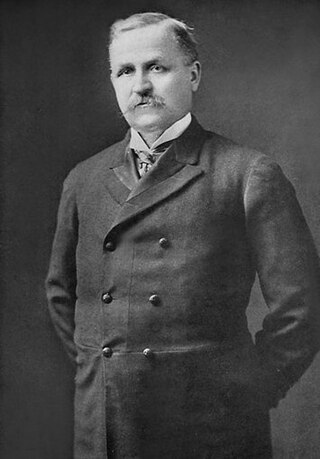
William Scott Ament was a missionary to China for the American Board of Commissioners for Foreign Missions (ABCFM) from 1877, and was known as the "Father of Christian Endeavor in China." Ament became prominent as a result of his activism during the Boxer Uprising and controversial in its aftermath because of the personal attacks on him by American writer Mark Twain for his collection of punitive indemnities from northern Chinese villages.

The Battle of Yangcun was a battle during the march of Eight-Nation Alliance forces from Tianjin to Beijing during the Boxer Rebellion. The Alliance forces defeated the Qing and were able to continue their march towards Peking.
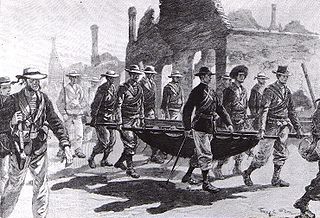
The Seymour Expedition was an attempt by a multi-national military force to march to Beijing and relieve the Siege of the Legations and foreign nationals from attacks by government troops and Boxers in 1900. The Chinese army and Boxer fighters defeated the Seymour armies and forced them to return to Tianjin (Tientsin). It was followed later in the summer by the successful Gaselee Expedition.
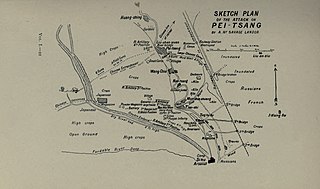
The Battle of Beicang known also as the Battle of Peitsang, was fought August 5, 1900 during the Boxer Rebellion, between the Eight Nation Alliance and the Chinese army. The Chinese army was forced out of its prepared entrenchments and retreated to Yangcun. The Japanese contingent led the Alliance attack; with contingents also being present from Russia, Britain, America and France.

The siege of the International Legations occurred in 1900 in Peking, the capital of the Qing Empire, during the Boxer Rebellion. Menaced by the Boxers; an anti-Christian anti-foreign peasant movement, 900 soldiers, sailors, marines, and civilians, largely from Europe, Japan, and the United States, and about 2,800 Chinese Christians took refuge in the Peking Legation Quarter. The Qing government took the side of the Boxers after the Eight-Nation Alliance invaded Tianjin at the Battle of the Taku Forts (1900), without a formal declaration of war. The foreigners and Chinese Christians in the Legation Quarter survived a 55-day siege by the Qing Army and Boxers. The siege was broken by an international military force, which marched from the coast of China, defeated the Qing Army, and occupied Peking. The siege was called by the New York Sun "the most exciting episode ever known to civilization."

Francis Dunlap Gamewell was a Methodist missionary in China. He was the chief of the Fortifications Committee in the Siege of the Legations during the Boxer Rebellion in 1900 and was acclaimed as one of the heroes of the siege.
The China Centenary Missionary Conference, held in 1907 in Shanghai, China commemorated 100 years of Protestant missionary work in China and debated future courses of action. Among other actions, the conference approved a resolution endorsing the exclusion from Chinese law given Chinese Christians in the "unequal treaties" imposed on China by European countries, the United States, and Japan.



















